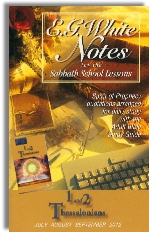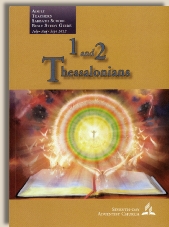|
||||||||||||||
Commentary on "Thessalonica in Paul's Day"
Day 2: Sunday, July 15, 2012 - The Romans Arrive in Thessalonica
Overview
Sometimes the political context in which a biblical writing is set may shed some light on the reasons for which the message of God is rejected. This is indeed the case of Jesus' condemnation by the Jewish Sanhedrin which acted out of fear. Caiaphas, the great priest, was afraid that the Romans would consider Jesus to be a political revolutionary, an illegal Jewish king whose popularity would put the nation in danger of becoming a target for internal war. Consequently, Jesus' death was seen as the only feasible and accepted casualty because the alternative, the disappearance of the Jewish nation was unthinkable.
Observations
Jon Paulien mentions this episode in the second day’s study with the intention of paralleling it with the political setting at Thessalonica and the role it played relative to God's message. Thessalonica was pro-Rome and pro-emperor and asked for protection around 168 BC while fighting in the civil war against other Greek cities. The result was advantageous for the ruling and upper classes of society, but not for the ruled classes, who found themselves under leaders who had the interest of the Roman emperor and not the local population at heart, disrupting the economy and imposing heavy taxes. Obviously people increasingly desired change.
Jon Paulien's analysis of this political context is continued the next day (Monday), but he already draws some implications for the reception of the gospel. He writes about hopes for change entertained by the low classes of people, making them favorable to the reception of the gospel. Paulien sees this hope and receptivity to the gospel as effecting political change. This implicit line of thought is problematic, especially in the light of Jesus' words to the Roman governor, Pontius Pilate:
“My kingdom is not of this world. If my kingdom were of this world, my servants would have been fighting, that I might not be delivered over to the Jews. But my kingdom is not from the world.” (John 18:36 ESV)
Jesus clearly shows that his kingdom isn't a political kingdom, doesn't fight for political change, and is politically neutral. In this context, the gospel of the kingdom has nothing to do with desired political change, and seeing it as a political solution is a gross misunderstanding of its content. The gospel is the message of liberation from sin's guilt, power and dominion, not from Rome's power and dominion.
On the positive side it is quite possible that this misunderstanding would have played a role in the rejection of the gospel by some of the ruling classes of Thessalonica, people interested in maintaining their social status and privileges. Like the Jewish ruling priest Caiaphas, they would worry that the new message would be perceived as a political rebellion and consequently they would persecute those who would embrace it, and indeed the church at Thessalonica was persecuted in a way similar to the way the church at Jerusalem was persecuted (1 Thess. 2:14-16).
Still, the persecution is not politically related but is tied to man's love for sin and for his slavery. The gospel and the church disrupt the natural, sinful order of society, and this disruption creates a battleground. Jesus's kingdom, while not political, affects people's interests in all spheres of life, including the political and social areas, although in an indirect way. While not promoting a peculiar "Christian" political ideology, it affects the way in which Christians vote or think about political involvement. First and foremost a Christian's loyalty is given to Christ, and no political power can have absolute authority over the life of Christian citizens. Jesus is Lord even over Caesar, and this Lordship is unacceptable to the ruling class. In this sense, the gospel brings liberty even in the political realm, elevating those who embrace it above the tyrannical rule of their political oppressors. There is indeed a gospel paradox, since, even if the ruled classes remain under the political domination of the ruling class, they are at the same time free in a sense that is threatening, perhaps more free than they would be if a political revolution took place. That's because the liberty brought by the gospel is not a political liberty which can be restricted or cancelled; it's in the spiritual domain where no human power has access.
It's simply untouchable.
Copyright 2012 BibleStudiesForAdventists.com. All rights reserved. Revised July 15, 2012. This website is published by Life Assurance Ministries, Camp Verde, Arizona, USA, the publisher of Proclamation! Magazine. Contact email: BibleStudiesForAdventists@gmail.com.
The Sabbath School Bible Study Guide and the corresponding E.G. White Notes are published by Pacific Press Publishing Association, which is owned and operated by the Seventh-day Adventist church. The current quarter's editions are pictured above.
Official Adventist Resources
Standard Edition Study Guide Week 3
Teacher's Edition Study Guide Week 3
Easy Reading Edition Study Guide Wk 3
Search the Complete Published Ellen G. White Writings
Please Support This Project


